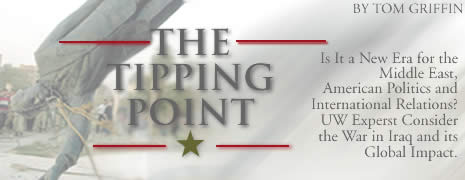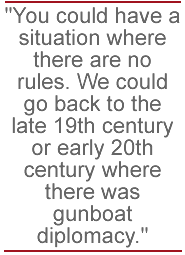

Joan Fitzpatrick![]()
The late Law Professor Joan Fitzpatrick had been teaching international law for 23 years, the last 19 at the UW law school, when she was interviewed for this article in late April. In her career she wrote or co-authored eight books on international law and specialized in international human rights and refugee law. She died unexpectedly on May 16th, after the print version of Columns had gone to press.

There have been many questions about the legality of the Iraq War under international law. Can you explain President Bush's position?
There are many rationales out there but only one is very convincing. The argument is that the U.S. is implementing Security Council resolutions 676 and 687, which were passed in 1991 during the invasion of Kuwait and the first Gulf War. The argument is that these resolutions were never fully implemented and that they authorized the use of force. … When Iraq kicked out the inspectors in 1998, it was a material breach of these earlier resolutions.

On the other side we have countries such as France, Germany and Russia saying the war is illegal. What was their argument?
The Security Council did not re-authorize the use of force in 2002-2003.. You see, the use of force is the last resort in international law, it's the essence of the U.N. Charter. You don't resort to the use of force until you have used up all peaceful methods. Their argument was that the inspections were working.

Critics have said that international law and institutions, such as the U.N. and International Court of Justice, were weakened when the U.S. and U.K. bypassed the Security Council and went to war. Could this be the tipping point-from now on less trust in multilateral organizations?

It's potentially very detrimental. The whole idea of the U.N. Charter was collective security. The Security Council would have the monopoly on armed conflict, except for imminent attack. Now we have the Bush administration arguing that the opposing nation doesn't have to be a imminent threat, just a potential threat. Instead of pre-emptive self-defense you have preventative self-defense. Some of the advisers go even farther. They feel the U.N. Charter regime is obsolete and needs to be revised. You could have a situation where there are no rules. We could go back to the late 19th century or early 20th century where there was gunboat diplomacy-if we didn't like the way a Central American country was treating a banana company, we'd send down a gunboat.
On the other hand, the U.S. needs the U.N. as much as the U.N. needs the U.S. I don't think the Iraqi oil revenues are going to cover the costs of reconstruction. Is the American taxpayer going to want to foot the bill? There needs to be a shift of responsibilities to the international community and that means the U.N. They've done it in Kosovo and in East Timor and other places. The U.N. is not going to disappear.

Speaking of reconstruction, what are the responsibilities of the U.S. and U.K. as occupying powers in Iraq?

Cartoon by Steve Sak, © 2003 Minneapolis Star Tribune.
The United States is responsible for restoring law and order and providing for the basic needs and security of the people of Iraq. That's the price of invading another country. Providing security against looting is our responsibility because by displacing the existing regime, we have created a legal vacuum. Responsibilities of an occupying power with respect to the civilian population are detailed in the Fourth Geneva Convention of 1949. An insufficient number of troops to restore order is no excuse. It was our choice to invade without a large number of troops.

If Saddam Hussein, his sons or the top Iraqi leadership are caught, there may be a war crimes tribunal. How would that work?
There are several possibilities. You could have an ad hoc international tribunal created by the Security Council. This is what we have for Yugoslavia and Rwanda. Or a nation with universal jurisdiction-like Belgium or Spain or Switzerland-could try Saddam under their existing criminal statues. Or you could have a U.S. military court tribunal like we had after World War II in Japan, where we tried Japanese General Tomoyuki Yamashita for war crimes during the occupation of the Philippines. The Iraqis themselves could try them in their own courts. Most likely is a hybrid tribunal where you have international jurists sharing the courtroom with Iraqi judges. That model is what we have right now in the Cambodia tribunals.
Go To: Page 1 | Page 2 | Page 3 | Page 4
- Return to June 2003 Table of Contents